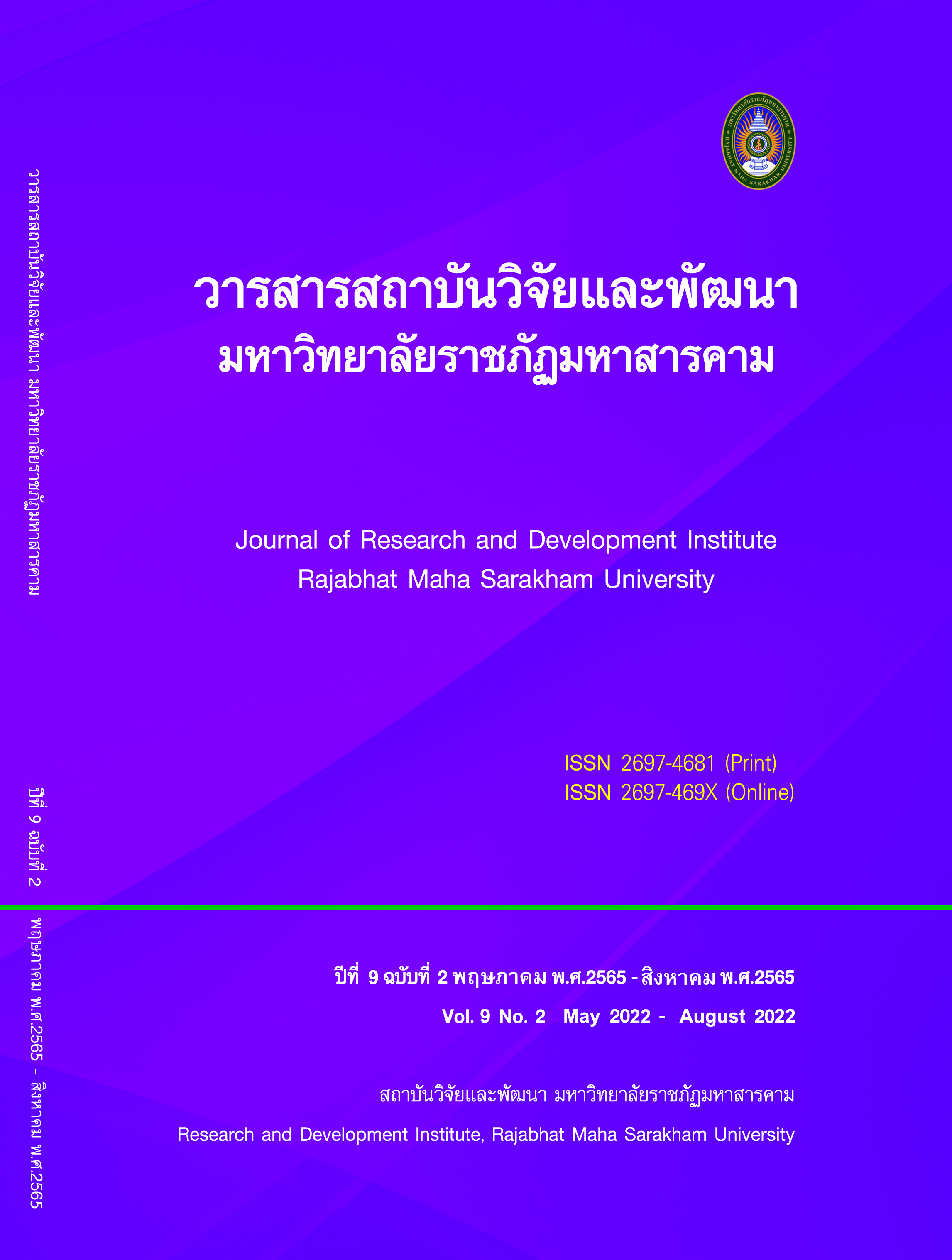Life Skills Development Model for Early Childhood Under the Office of the Basic Education Commission
Keywords:
Life Skills, Early Childhood, Model DevelopmentAbstract
This research aimed to; (1) study components, indicators and guidelines for the development of life skills development for early childhood. Under the Office of the Basic Education Commission; (2) Create a developmental model for the development of life skills for early childhood. Under the supervision of the Office of the Basic Education Commission; (3) to study the results of the use of a life skill development model for early childhood Under the Office of the Basic Education Commission; and (4) Evaluate the Life Skills Development Model for Early Childhood. Under the Office of the Basic Education Commission. The researcher conducted the research in accordance with the research and development process. The research instruments consisted of a questionnaire with a 5-point rating scale, an evaluation scale with 5-level estimation scale, and a rubric model. Scoreboard Conduct quantitative and qualitative data analysis The statistics used in the research were percentage, mean, and standard deviation.
The results showed that; (1) life skills for early childhood. Under the Office of the Basic Education Commission There are 5 indicators in the Roi Sin Sub-district, 19 indicators, as follows: indicator 1, honesty, there are 4 points, consider indicator 2, generosity, share, there are 4 points, consider indicator 3, consciousness There are 4 issues. Consider the 4 indicators. Endurance. There are 3 issues. Consider the 5 indicators. There are 4 sufficiency; (2) The model of moral development according to the philosophy of the sufficiency economy of students in the municipality of Roi Kaen Sub-district There is a structure chart that is related in 6 components which are; (1) the principle and reason; (2) Objectives; (3) Morality in accordance with the philosophy of the sufficiency economy of the students; (4) The guidelines for the moral development according to the philosophy of the sufficiency economy of the students are 7 driven activities and 1 supporting activities; (5) Learning media and 6) Measurement and Evaluation And the model evaluation results found that the model of moral development according to the philosophy of the sufficiency economy of students in the municipality of Roi Kaen Subdistrict Province Is appropriate as a whole at a high level And have overall possibilities At a high level; (3) The students had the result of the moral evaluation according to the philosophy of the sufficiency economy of the students in the municipality of Roi Kaen Subdistrict, before the overall development was at a medium level and the result of the moral evaluation according to the philosophy of the sufficiency economy Of the hundreds of hundred thousand municipal government students in the provinces after the overall development was at a high level. And the students had the result of moral evaluation according to the philosophy of the sufficiency economy of the students in the municipality of Roi Khon Kaen Subdistrict. In each activity, 7 activities, including effective activities for opening a house, ministering to a place, meaningful day-beginning activities Mental education activities, internal intelligence development, creative arts activities, bowing activities, physical and imaginative / sensual / aesthetic body exercises, organized mind-body activities with evaluation results at a higher level Which accounted for 85.40, 87.03, 86.47, 88.34, 88.03, 86.29 and 86.58 respectively; (4) The model of moral development in accordance with the philosophy of the sufficiency economy of students in the Municipality of the Roi Kaen Subdistrict Province has the overall evaluation at the highest level and the relevant parties are satisfied with the development model. Morality according to the philosophy of the sufficiency economy of students in the municipality of Roi Kaen Subdistrict, in the level of
References
Buason, R. (2011). Research and Development of Educational Innovations. (3rded). Phitsanulok: Rimping.
Euarat, P. (2012). Moral Promotion. Ethics according to the philosophy of economics Student Sufficiency: Participatory Action Research In the case of Phadungnaree School under the Office of Secondary Education Service Area, District 26. Maha Sarakham: Maha Sarakham Rajabhat University.
Kleejohor, S. (2011). The Development of Indicators of Desirable Characteristics in Sufficiency of Elementary School Students. Journal of Educational Measurement Mahasarakham University, 17 (2).
Panich, V. (2013). Enjoying learning in the 21st century. Bangkok: Siam Commercial Foundation.
Poonpat, J. (2011). Montessori Teaching Manual. Bangkok : The Master Group.
Rangchaikulwibulsri, Y. (2005). Project Evaluation: Concepts and Practices. (4thed). Bangkok: Chulalongkorn University.
Rangsiyanon, K. (2016). Developing a model for organizing the Buddhist learning process for early childhood. Bangkok : Ramkhamhaeng University.
Srisa-ard, B. (2003). Curriculum Development and Curriculum Research. Bangkok : Suwiriyasan.
Srisa-ard, B. (2003). Curriculum Development and Curriculum Research. Bangkok : Suwiriyasan.
Tantivejkul, S. (2016) “Royal Initiative “Sustainable development” brings benefits and happiness to the people”. King Prajadhipok's Institute journal, 14 (3), 51-64.
Wattanachai, K. (2016). Moral School (8thed). Bangkok: Thanat Print.
Worakham, P. (2016). Educational Research. (8thed). Maha Sarakham: Taxila printing.
Downloads
Published
How to Cite
Issue
Section
License
Copyright (c) 2022 Journal of Research and Development Institute Rajabhat Maha Sarakham University

This work is licensed under a Creative Commons Attribution-NonCommercial-NoDerivatives 4.0 International License.
Articles that are published are copyrighted by the authors of the articles







